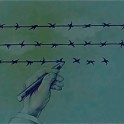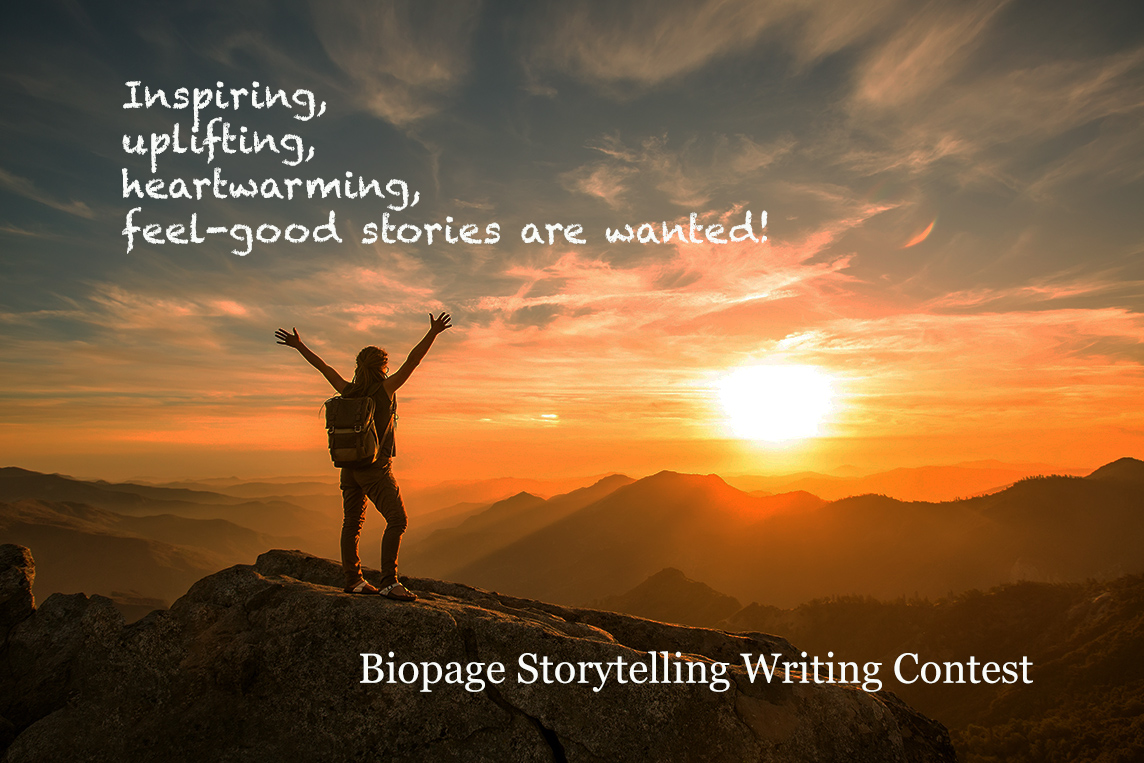Be the gauze that wraps a hurt, Offer solace in times of sorrow. Let the needy your tears borrow, With empathy always others girt. Let the depressed with spirit spurt, Shoulder burdens on paths narrow. Sing for the voiceless as a sparrow, 'Gainst injustice, righteous energy exert. Fear not the consequences heavy, When the downtrodden you support. Faith shall counter malicious envy, Cause persecution to go athwart. Demons' threats are futile, empty, Your soul's mission never, ever abort!
Warrick propped up the soft pillows behind his granny's head as she lay like a gaunt specter of her previous spirited self in her deathbed. And deathbed it was indeed. At nineteen, Warrick knew death when it looked him in the face. He had become all too familiar with it when his mother had wasted away from cancer of the stomach two years ago. “My boy,” Kathy wheezed, fondly squeezing Warrick's hand with the last of her strength. “I'm so sorry you're burdened with me,” she added, tears flooding her faded eyes. Guilt overwhelmed her frail body, making her curl even further into herself. She was grateful that the agony that wracked every part of her broken body seemed suspended for now. “You're not a burden, Granny!” Warrick said , looking into the old woman's watery eyes. He was afraid to sit on the bed for fear of causing her any discomfort or hurt. “You were there for me when Mom passed away, and you've always looked after me even before that, so this is nothing. I can never repay you, so don't think or say you're burdensome to me. You're my blessing.” His words nearly undid the old woman's hold on her emotions. “I'm going to prepare supper now, all right? I managed to borrow a can of peas from Brian's mom. We've still got carrots and potatoes, so I'll make us a stew. I think there's enough rice left for one pot,” Warrick said, hating the fact that they were truly living on the edge of poverty. “Since this terminal illness struck down my granny,” Warrick said to Brian later that night, “I've had to become caregiver, cook, house cleaner and nurse. You know my dad abandoned us when I was only eight, and my mom slaved all her life as a domestic worker to provide for us,” Warrick added. Brian was his school mate; they were more like brothers than friends. “With your granny becoming ill, looking after her fell on you. You can't even look for a job 'cause your granny needs constant care,” Brian commiserated. “Is there any hope for her recovery?” “None. At our last hospital visit, her doctor told me to ‘make her as comfortable as possible' here at home. How can anyone who's dying so slowly ever be comfortable?” Warrick asked, covering his face with his hands, his shoulders hunched forward. “It's bad, bro. I don't know if I could've handled this, to be honest,” Brian said. He reached out to give Warrick's shoulder a long squeeze before going home. Kathy had heard the conversation between the two boys. By some quirk of the night or fay life, their hushed words had reached her clearly as she lay statue-still, imprisoned by her bed. She felt some remnant of fury trying to bubble up from her breast, anger that she had become this weak when before she had been energetic, industrious and a whirlwind of movement. Being this incapacitated often made her feel wrathful, but she swiftly smothered the emotion. It would only bring on the vicious barbs of pain. Her medication sat on her bedside table, within easy reach. Warrick is truly thoughtful, she thought, then she started to cry softly. He doesn't deserve to have his life placed on hold because of me, the bitter thought flitted through her mind, superseding the twisting, torturous pangs running amok throughout her body. As the last rays of the setting sun peeped through a chink in her bedroom curtains, Kathy slowly, painfully, sat up in bed. She reached for the morphine pills. With immense determination, she poured all the pills into her cupped hand. Closing her eyes, she prayed one final time. Forgive me, God. I know I'm damning my soul forever, but I would rather do that than have Warrick sacrifice another day of his young life. With a trembling hand, Kathy gripped the glass of water. She looked lovingly at her bedroom, at the knickknacks on her dresser, the antique wooden wardrobe her husband had made himself ages ago, her rocking chair next to the small, round reading table on which a novel waited for her to finish reading it for probably the twentieth time. She smiled wanly as she recalled the joy she had experienced upon first reading the book; that happiness had only increased with all the other subsequent readings. 'Gone with the Wind', by Margaret Mitchell. I have no regrets, except one. I'll be leaving Warrick sole alone in this cruel world. May he forgive me. Closing her eyes again, tears seeping from under her closed eyelids, Kathy brought the pills to her mouth. A warm, soft touch arrested her cupped hand. Kathy's eyes flew open in surprise, only to see Warrick standing in front of her. His cheeks were moist with his trailing tears. The forlorn look on his face broke her heart anew. “Granny, this isn't the way. God will ease our suffering. We only need to hold on to our faith and believe in His mercy,” Warrick whispered before carefully enfolding the tiny, fragile frame of the old woman in his strong, youthful arms. “My sweet, sweet angel,” Kathy breathed softly.
How does it feel? To birth children and let them suffer for bread? Their cross, at a tender age, made to bear. They struggle and strive To survive in all fear, Amidst tears, education, and etiquette they forgo, For money and survival, they endure. How does it feel? To see these little ones suffer hardship unknown? Heartbreaks and traumas, they face untold. Responsibilities and breadwinning, at a tender age, exposed to. Can we not do the reproduction? Until we have adequate parental provision? Can we not bring them to the existence, When in the end, they will question their existence? These little ones have crosses to bear. But can it be a ‘just' one? The right one for their age and time Can we let them bear the cross of excellence? Can we win their daily bread? And to take up responsibilities bigger than they? Can we birth them when we are ready? And capable of giving them a life they deserve? One which is theirs? I write to becoming parents & spouses. Think of that ‘fetus' life after delivery. Birth, not that child because you impulsively want a child. Birth them for their good. The cross is too heavy for our present-day children. The struggle is tougher to them than it seems. Their young shoulders are beginning to sag. Their tiny little feet are beginning to fret They come to stagger in motion Yet the world lives in contention Some children are torn in between Who may help or redeem? And to help them bear the cross?
When asked what one's ideal life looks like, many often wish for eternal happiness, or life without any affliction. However, suffering may be even more of a necessity than it is inevitable, for often times, it is only in periods of adversity where we can learn more about ourselves and the world, and undergo character growth. Upon reading an excerpt from Aleksandr Solzhenitsyn's, The Gulag Archipelago, my belief in the latter was solidified as I read of the conclusions he drew from both his personal experiences and the tales of others during his time in the forced labour camp. In the beginning, Solzhenitsyn discusses the personal growth one can achieve through suffering and the inexplicable ripening of the soul that occurs when one's freedom is taken away. He discovers that in times of extreme suffering, one is able to understand that in life, it is not the result that counts, but the spirit with which the individual arms himself with. When you are able to reorient what reward and punishment mean to you, there is nothing that can be done to harm or scare you so long that your soul is still intact — that you are still endowed with humanity and goodness. Solzhenitsyn also remarks that through suffering, you learn of your own weakness and become more empathetic in understanding others' struggles, and appreciate another's strength. Though his ideas have developed in the context of a forced labour camp, his discoveries act as an important lesson to us in our daily lives that suffering gives way to growth, regardless of what kind of struggles we face. When we experience hardships, we will realize that it is not what but how that is of significance. When we are deprived of our freedoms and faced with our own weaknesses, we come to understand the weaknesses of others and appreciate their strengths. And perhaps most important of all, when we are imprisoned with an innocent conscience, we must remember to reorient our view as to what punishment truly is. If we see reward as upward development of the soul, then, like Solzhenitsyn says, “from that point of view our torturers have been punished most horribly of all: they are turning into swine, they are departing downward from humanity.” If the soul remains free, then imprisonment of the body is insignificant. Perhaps even more important is that Solzhenitsyn's time at the camp leads to his discovery that “the line separating good and evil passes not through states, nor between classes, nor between political parties either — but right through every human through all human hearts.” Good and evil exists in all of us — it is not separated by distinctions between classes of people. Rather, “this line shifts; inside us, it oscillates with the years: and even within hearts overwhelmed by evil, one small bridgehead of good is retained, and even in best of all hearts, there remains… an up-rooted small corner of evil.” Through his suffering, Solzhenitsyn realizes that though in different periods of our lives the ratio of good and evil may vary, the nature of human provides that both will always exist simultaneously. For this reason, I always seek to understand instead of criticize, as it has always been my personal belief that there is a tiny seed of goodness in those who may seem far beyond it, and alternately, a shard of evil or temptation to do wrong even in those with the purest of hearts. Upon reading this section of the excerpt, I was also reminded of the Harry Potter series. One of the major themes in the novels is to remember that nothing is black and white, and to have compassion for others as we are all capable of both good and bad. One line that this excerpt specifically reminded me of was when Dumbledore states that “it [is] important... to fight, and fight again, and keep fighting, for only then [can] evil be kept at bay, though never quite eradicated...” Though this can refer specifically to the context of war, it can also refer to a deeper and more personal battle that each of us have to fight not just once, but throughout our lifetime. Much like what Theodore Dalrymple says in “How — and How Not — to Love Mankind” about the victory over cruelty requiring eternal vigilance, man's capacity for humanity is something that must be constantly exercised, as man's capacity for inhumanity can never truly be eradicated. Overall, Solzhenitsyn's, The Gulag Archipelago, provided me with deeper insights and discoveries concerning the true usefulness of suffering in the “ascent” of one's soul that I feel I must share with all. The findings that Solzhenitsyn unearthed both about himself and the world are remarkable and provide the key insight that perhaps we should not hope for a life with no pain or hardships, but instead, seek the ability and freedom to govern our own souls in times of suffering and imprisonment.
As a senior in high school, introspection has become increasingly prominent, and a specific period of time that I have not deigned to think about in detail since its occurrence has been brought to mind. Thus, for the purpose of not only sharing my experience with the reader, I will do so to bring closure to myself. Like many others, my entrance into high school was marked by the formation of opinions of my own and the realization that certain things that I had been taught to believe were perhaps, not so at all. This alone caused a series of conflicts that were both internal and external, and brought about a slew of upsetting personal and family matters. However, it was in the tenth grade when things really started to go downhill. Perhaps my memory eludes me now, but I cannot pinpoint how or when exactly my mental health began to decline: not even an in-depth review of my past journal entries can give me an exact date or play-by-play of how exactly I fell into the grasp of an illness that trapped me for almost two years. What I can recall, however, are flashes of specific memories. For example, if I close my eyes, I can still remember the cold yet vague feeling of the unfriendly bathroom floor digging into my back, increasingly familiar when it shouldn't be. I can still recall that nauseating feeling of loneliness, sinking into me even when I was around others… I can still remember the overwhelming hollowness that was too much nothing and still not enough substance to fill that ever-growing lump of nothingness... I can still taste the bitter aftertaste of frustration and disgust on my tongue…the sharp tang of metallic anger, a lingering ghost of a memory. There would be stretches of time when it seemed that I was numb to everything including myself. There would be times when I was sensitive to the point that one snarky little comment would tip me over the edge and everything would collapse unto itself. There would be times when I could give a little smile and convince myself that I was doing alright, and then suddenly, I would have a sort of emotional collapse and find myself taking refuge in a bathroom stall, overwhelmed with shame. This cycle occurred again and again, and to be honest, it didn't seem to make any sense at all. I was fortunate in my circumstances and extremely privileged. I had never once been deprived of my basic needs or individual rights. I had everything, recognized this indisputable fact, genuinely was grateful for it, but the rest of me could not seem to follow my rational mind. I was still completely and utterly desolate, only now, I was only more disgusted at myself for feeling so. How could I claim to be suffering when there were those who were suffering with much less? These questions attacked me everyday, and those who have not experienced this feeling cannot truly understand the terribleness of this personal dilemma where one is suffering, knows that it is irrational to suffer, but still suffers. Now, of course, I know that depression itself is somewhat arbitrary in the selection of its hosts, quite similar to a virus. It's surprising how many overlook the obvious; that it really is an illness in the sense that it grips you often without much reason and changes you. Like a fever, it leaves you incapable of doing and feeling and enjoying, and the recovery is slow, and often uncontrollable and unpredictable. For me, this was certainly the case. Months crawled by with ups and downs, and often rock-bottoms but slowly, almost unnoticeably so, I improved. This might not be what you expect or want to hear, but I found it significant to accept that I was alone, not necessarily because others were unwilling to help, but because ultimately, they simply did not have the ability to. Though this might seem incredibly counter-productive, and for a while it was extremely debilitating, the realization that no one could truly help me except for myself became strangely empowering over time. In the end, I learned to not only love myself, but to also like myself. I turned my pain into wisdom, directed my focus outwards and focused on helping others, which gave me a greater sense of purpose. My own experience has opened my eyes to the importance of seeking to understand instead of to criticize, and I want to communicate that you must not undermine, or let others undermine your suffering. Be warned; I don't mean that you should barrel ahead in an oblivious state — you must recognize and have gratitude for what you have, and have deep empathy for those who have less, but suffering is suffering, and through it, we can learn more about the world and ourselves. Yes, my greatest enemy is myself, but in being so, I am also my own greatest weapon.
Pray tell, what do you think a child dreams of? Perhaps they wonder what it's like to soar through the sky? Or they dream of exploring the infinite universe? Or maybe they think about what growing up feels like? Each child has their own dreams and wonders, their own desires and destinies that they wish to pursue. So why is it that, in a world where following ones dreams is a universal goal, very few manage to get there? I'll tell you why. These dreams children often have, dreams that make them smile and excited for the next day to come as they rest their heads for the evening, are crushed by those who had their own desires smashed to bits in front of their very eyes. We dream to be whatever we desire before those wishes are blown to dust, and then we grow up only to do the same to our own children. Why does this cycle of misery continue so often? Why is it so hard to break this link, this chain, that holds many of us down? I once dreamed of many things. I wanted to be a ballet dancer, then a singer, then a firefighter, then an artist, and then soldier working to protect my country. All of those dreams were decimated by my family. I understood well enough that they had good intentions, and their reasoning was everything but illogical (we are too poor to pick ourselves up after the fall after all). However, everything has become different for me now. I fear of the future, and my desires are unclear. Do I chose what is best for my family's sake, as well as my own, or do I follow my heart's true wishes and let my dreams guide me through the rocky stream of life? Do I work simply for the pay so I can live a better life, or do I work because I enjoy it and love doing what I accomplish? My life has made it all hard to choose. I had grown up believing that I can only have one, not the other, and thus cannot formulate a plan to achieve both goals. Even in writing--for I once shared my desire with my brother only for him to tell me I could not simply because I couldn't earn enough money unless I had plenty of wealth and connections at my disposal, in which I had neither nor--I know not whether to pursue this dream or to abandon it like all the others. My love for stories, helping others in need, children, and the creatures of this planet that we hold so dearly to our hearts is what drives me to pursue these careers. Yet, the need to do better than those before me who did not go to college, who had children at a younger age than they should have, and are still too poor and can barely afford rent every month drives me to pursue careers I have no interest in whatsoever. My whole life I have been stuck in this infinite loop of choices, deciding the pros and cons of each path, and I still have not found my way. Now here I am, a junior in high school almost ready to leave for college, and I still have the same broken mentality of my younger self. The version of me who could not decide for herself, and thus let others do it for her because it made them happy. The version of me who did what she desired in secret and was forced to wear a mask around her own flesh and blood. The version of me who at a young age continued to foolishly follow her heart only to have it broken again and again, over and over, until she could take no more and grew a lust for revenge against her transgressors. The version of me who was once so innocent and so pure, and who is now nothing more than a walking sag of flesh waiting until the day she can finally rest and leave this world behind forever, relieving her of all that has saddened and angered her for decades. So, again, I ask of you: what do you think a child dreams of? Space? Love? Adventure? Well, one thing is certain. This child here dreams of being herself again. She dreams of freedom, true love, and a happy life. It matters not to her how she gets there. She cares not if she is poor or rich. She cares not if she has a 3-acre mansion in LA or lives in a one bedroom apartment in Brooklyn. The only thing she cares about is finally being happy again. That is her childhood dream.













